|
|
|
Sort Order |
|
|
|
Items / Page
|
|
|
|
|
|
|
| Srl | Item |
| 1 |
ID:
052017
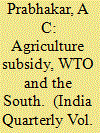

|
|
|
|
|
| Publication |
Jul-Dec 2003.
|
|
|
|
|
|
|
|
|
|
|
|
|
|
|
|
| 2 |
ID:
153138
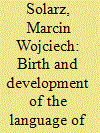

|
|
|
|
|
| Summary/Abstract |
The 1940s saw an intensification of worldwide interest in the problems of development and underdevelopment. One consequence of this was a rapid evolution of the language of global development. The reconstruction of its genesis is most commonly attempted through the analysis of literature on the subject and accounts by those who took part in or observed the debates of the time concerning the world’s development and structure. This article proposes a different approach which locates important events in the evolution of the modern language of global development on timelines tracing populational, political, socio-economic and civilisational processes.
|
|
|
|
|
|
|
|
|
|
|
|
|
|
|
|
| 3 |
ID:
151208
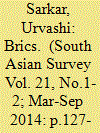

|
|
|
|
|
| Summary/Abstract |
Brazil, Russia, India, China and South Africa (BRICS) have received considerable analysis as a group attempting to present an alternative to West-driven institutions and hegemony. While its formation is a positive development for the South, it requires to reach out to civil society. BRICS, minus a robust civil society involvement, will only result in entrenching viewpoints that see the BRICS as representing narrow business interests of a southern elite, with little concern for the gamut of socio-economic problems confronting the people of Southern nations.
|
|
|
|
|
|
|
|
|
|
|
|
|
|
|
|
| 4 |
ID:
113355


|
|
|
|
|
| Publication |
2012.
|
| Summary/Abstract |
In the context of knowledge-intensive globalisation and severe poverty, policy makers in the South face various educational planning dilemmas. These are ultimately political, implying that there are no ways of avoiding tensions and trade-offs when attempting to handle them. Such dilemmas have been subject to debate in the research community and have been framed differently in different historical contexts. The contemporary development policy discourse, however, largely conceals the existence of dilemmas by suggesting that we have reached a global consensus regarding the role of education in development. This article illustrates that this consensus is imaginary and consequently aims to reframe educational planning dilemmas in the contemporary policy context. It is shown that the dilemmas have changed character and now largely revolve around how to navigate and negotiate in highly complex political landscapes. Future research should focus on such ongoing wars of position and expose the many tensions concealed by the hegemonic policy discourse.
|
|
|
|
|
|
|
|
|
|
|
|
|
|
|
|
| 5 |
ID:
162021
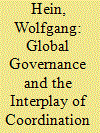

|
|
|
|
|
| Summary/Abstract |
Developing an adequate sustainable energy supply in developing countries is a major challenge for the global community. Recently, a large number of organizations and enterprises have been supporting technological development, carrying out advocative actions, and offering finance for renewable energy. Concomitantly, there have been strong calls to improve coordination in this field. This article elaborates on the importance of institutional opportunities not only to favor coordination, but also to contest common wisdom shaping energy policies and specific project features at a given time. The result would be a more flexible renewable energy “governance dynamics” to provide the institutional framework for private actors and the interaction with public entities. Thus, three dimensions of global governance are analyzed: coordination, contestation, and the resulting process of collective/interactive regulation.
|
|
|
|
|
|
|
|
|
|
|
|
|
|
|
|
| 6 |
ID:
095053
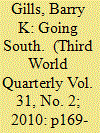

|
|
|
|
|
| Publication |
2010.
|
| Summary/Abstract |
This article argues that the current protracted and severe financial and economic crisis is only one aspect of a larger multidimensional set of simultaneous and interacting crises on a global scale. The article constructs an overarching framework of analysis of this unique conjecture of global crises. The three principal crisis aspects are: an economic crisis of (over) accumulation of capital; a world systemic crisis (which includes a global centre-shift in the locus of production, growth and capital accumulation), and a hegemonic transition (which implies long term changes in global governance structures and institutions); and a worldwide civilisational crisis, situated in the sociohistorical structure itself, encompassing a comprehensive environmental crisis and the consequences of a lack of correspondence and coherence in the material and ideational structures of world order. In these ways, the global system is now 'going south'. All three main aspects of the global crisis provoke and require commensurate radical social and political responses and self-protective measures, not only to restore systemic stability but to transform the world system.
|
|
|
|
|
|
|
|
|
|
|
|
|
|
|
|
| 7 |
ID:
106648
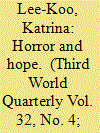

|
|
|
|
|
| Publication |
2011.
|
| Summary/Abstract |
This article examines the (re)presentations of militarised children in contemporary global politics. In particular, it looks at the iconic image of the 21st century's child soldier, the subject of which is constructed as a menacing yet pitiable product of the so-called new wars of the global South. Yet this familiar image is a small, one-dimensional and selective (re)presentation of the issues facing children who are associated with conflict and militarism. In this sense it is a problematic focal point for analysing the insecurity and human rights of children in and around conflict. Instead, this article argues that the image of the child soldier asserts an important influence in its effect upon global North-South relations. It demonstrates how the image of the child soldier can assist in constructing knowledge about the global South, and the global North's obligations to it, either through programmes of humanitarianism, or through war.
|
|
|
|
|
|
|
|
|
|
|
|
|
|
|
|
| 8 |
ID:
160355
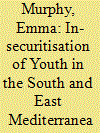

|
|
|
|
|
| Summary/Abstract |
The securitisation of youth as a social category has been well-documented. For the South and East Mediterranean (SEM) countries, moral panics over demographic youth bulges, Islamist radicalisation and protracted conflicts have placed youth centre-stage as a threat to the security of states and societies. Rejecting such assertions as themselves being what Foucault might have termed ‘technologies of power’ in a neoliberal order, and instead taking a critical approach to security, the spotlight is turned towards youth themselves as the referent object of study. This reveals the multidimensional hyper-precarity and insecuritisation of young peoples’ lives which derive from that same neoliberal economic order and the political structures that sustain it in the SEM countries. The finding resonates with other studies of new, insecure, formats for adulthood in Africa and suggests that we should look at the insecurity of young people today to understand global neoliberal futures in countries beyond the post-industrial ‘core’.
|
|
|
|
|
|
|
|
|
|
|
|
|
|
|
|
| 9 |
ID:
103512
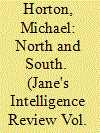

|
|
|
| 10 |
ID:
097668
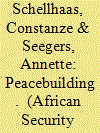

|
|
|
|
|
| Publication |
2009.
|
| Summary/Abstract |
Peacebuilding has been promoted as a new international paradigm guided by
humanitarian values and with the objective of bringing peace and justice to war-torn
countries. Critics say, however, that peacebuilding is a form of imperialism designed to
serve the interests of the powerful in the Bretton Woods system by pacifying and even recolonising
the countries of the South. We assess these perspectives to better understand
the main issues and implications of this unfolding debate. Despite the appearance of
something new, peacebuilding has the same assumptions as modernisation theory,
the Bretton Woods path of development. Most peacebuilding literature, by being nonreflexive,
helps legitimise this dominant ideology.
|
|
|
|
|
|
|
|
|
|
|
|
|
|
|
|
| 11 |
ID:
139023
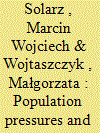

|
|
|
|
|
| Summary/Abstract |
This article examines the relationship between the populations of the more and less developed societies between the first century and 2100. Such an analysis reveals a changing dependency between the level of development (and GDP) achieved and population numbers between the first century and 1998. In relation to the past the article suggests a dynamic model for dividing the world into more and less developed areas. In relation to the present and the future it bases the population analysis on the developmental division of the world as published by one of the co-authors of this article. The article largely uses population estimates (with those referring to the past taken from Angus Maddison and those referring to the future from the most recent projections by the United Nations). Taking the 2013 UN projection as a model, it discusses three variants for demographic development in the North and South up to 2100. It argues that the more restrictive population growth variants of the UN projection predict a greater relative ‘Third Worldisation’ of the world than does the most dynamic projection.
|
|
|
|
|
|
|
|
|
|
|
|
|
|
|
|
| 12 |
ID:
101539
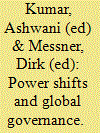

|
|
|
|
|
| Publication |
London, Anthem Press, 2010.
|
| Description |
xv, 359p.
|
| Standard Number |
9781843318316, hbk
|
|
|
|
|
|
|
|
|
|
|
|
Copies: C:1/I:0,R:0,Q:0
Circulation
| Accession# | Call# | Current Location | Status | Policy | Location |
| 055587 | 327.112/KUM 055587 | Main | On Shelf | General | |
|
|
|
|
| 13 |
ID:
123520
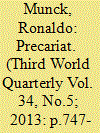

|
|
|
|
|
| Publication |
2013.
|
| Summary/Abstract |
The term 'precariat'-a precarious proletariat-has achieved considerable prominence in recent years and is probably now ripe for critical deconstruction. It also needs to be situated in terms of a genealogy that includes the marginality debates of the 1960s, the later informal sector problematic and the 'social exclusion' optic that became dominant in the 1980s. I will argue that the concept is highly questionable both as an adequate sociology of work in the North and insofar as it elides the experience of the South in an openly Eurocentric manner. In terms of political discourse I think we should avoid the language of 'dangerous class', as deployed by Guy Standing to situate workers politically in the policy world as though frightening the ruling classes was a strategy for transformation.
|
|
|
|
|
|
|
|
|
|
|
|
|
|
|
|
| 14 |
ID:
003403
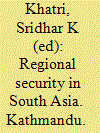

|
|
|
|
|
| Publication |
kathmandu, Centre for Nepal and Asian Studies, 1987.
|
| Description |
x, 295p.
|
|
|
|
|
|
|
|
|
|
|
|
Copies: C:2/I:0,R:0,Q:0
Circulation
| Accession# | Call# | Current Location | Status | Policy | Location |
| 029965 | 327.1160954/KHA 029965 | Main | On Shelf | General | |
| D29965 | 327.1160954/KHA D29965 | Main | On Shelf | General | |
|
|
|
|
| 15 |
ID:
098277
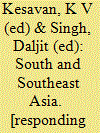

|
|
|
|
|
| Publication |
New Delhi, KW Publisher, 2010.
|
| Description |
xiii, 165p.
|
| Standard Number |
9789380502250, hbk
|
|
|
|
|
|
|
|
|
|
|
|
Copies: C:1/I:0,R:0,Q:0
Circulation
| Accession# | Call# | Current Location | Status | Policy | Location |
| 055168 | 355.0330959/KES 055168 | Main | On Shelf | General | |
|
|
|
|
| 16 |
ID:
153863


|
|
|
|
|
| Summary/Abstract |
Over the past decade or so, Brazil has become an increasingly active and visible global development partner, especially in Lusophone Africa and in Latin America, as part of a foreign policy strategy aimed at diversifying relations and expanding the country's presence in the global South. However, the period of high profile growth of South–South cooperation (SSC) under President Luiz Inácio Lula da Silva (2003–2010) was followed by a period of contraction under President Dilma Rousseff (2011–16). Rousseff's lower interest in foreign policy and Brazil's domestic economic and political difficulties have been the two main reasons advanced to explain this shift. We concur, but in this article we seek to nuance this argument. First, we suggest that the ‘retreat’ from SSC was not as deep as sometimes assumed. Second, we identify legacies from the Lula era which left Brazilian development cooperation vulnerable to downturns. These are: (a) the difficulties in updating legislation and institutions to accommodate the expanded role of Brazilian development cooperation; (b) the difficulties in cultivating political and public constituencies; and (c) enduring inter-Ministerial fragmentation. In the penultimate section, we comment on the early indications of where the post-impeachment Temer Presidency will lead SSC.
|
|
|
|
|
|
|
|
|
|
|
|
|
|
|
|
| 17 |
ID:
095810
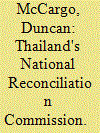

|
|
|
|
|
| Publication |
2010.
|
| Summary/Abstract |
This article examines the work of the National Reconciliation Commission (NRC) (2005-06), an independent body established by the government of Thailand to address a violent conflict in the country's southern border provinces. From the outset, the 50-member NRC chaired by former Prime Minister Anand Panyarachun was too large and unwieldy to function effectively. At the most basic level, there was a lack of trust and openness among the Commission's members which curtailed frank discussions. Because the political dimensions of the conflict were seen as off-limits, for a variety of cultural and historical reasons, the NRC produced a report that emphasized issues of justice, but failed to engage with the core questions underpinning the violence. Locating the NRC within an emerging global landscape of comparable 'truth commissions', the article argues that however well-intentioned, the Thai commission lacked clear goals, and was rather disappointing in its achievements.
|
|
|
|
|
|
|
|
|
|
|
|
|
|
|
|
| 18 |
ID:
121423
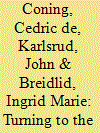

|
|
|
|
|
|
|
|